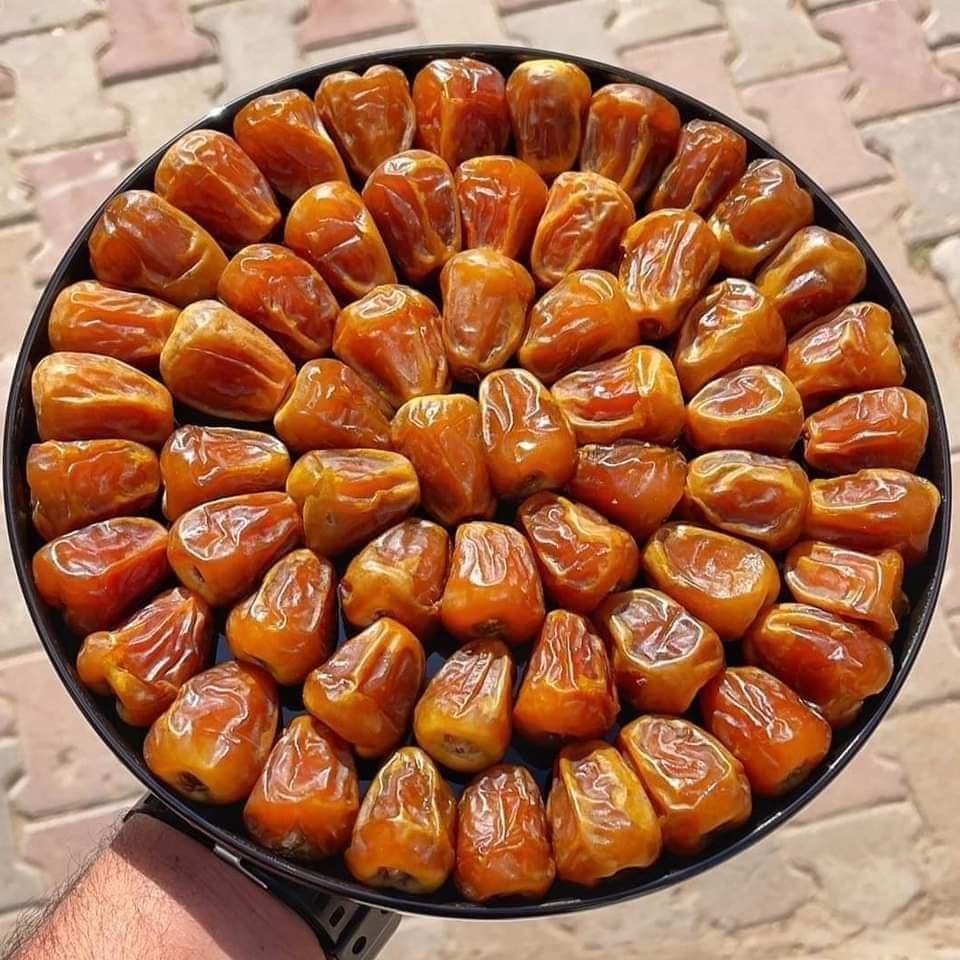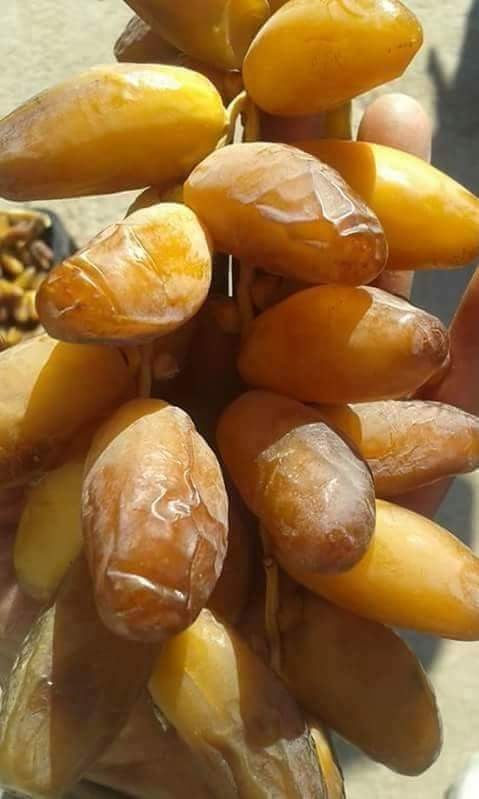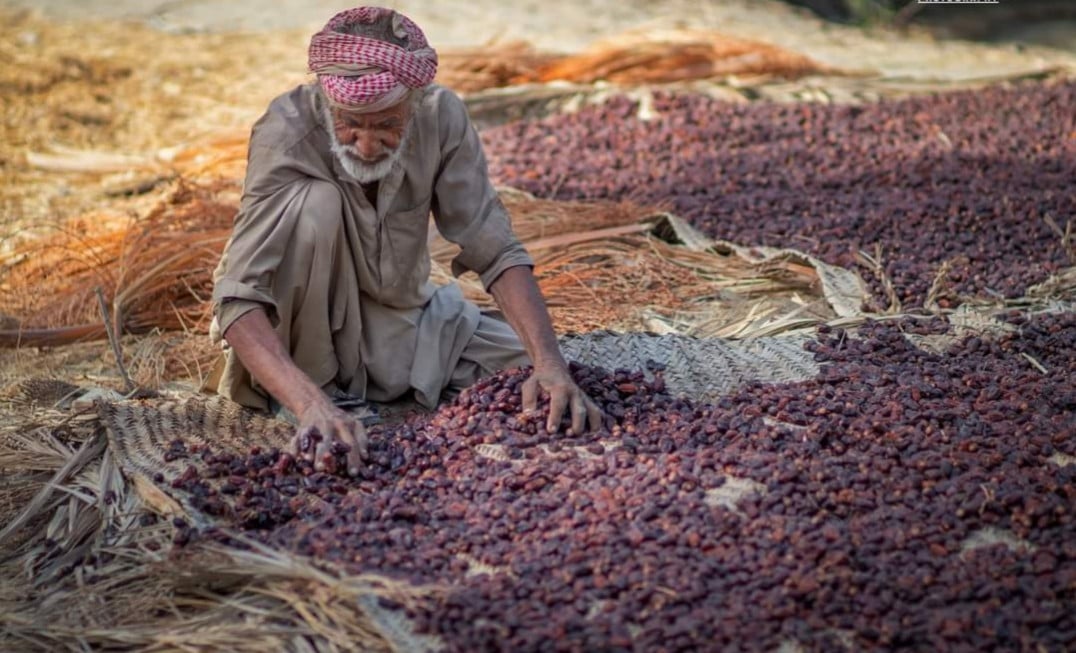On a sweltering September day in Kech district, Balochistan, I met Phullan, an elderly farmer, hard at work sorting dates in his wooden date store, locally known as a "shaganz." With sweat dripping down his face in the 49°C heat, I asked him to pause for a drink of water. “What compels me to work in this old age and extreme heat is poverty,” he replied with a hint of annoyance. “I am terribly fatigued because of overworking in my old age and this sweltering summer, but it has to be done for survival.” This is the life of many date farmers in Turbat, Balochistan, amidst the lack of basic amenities.
Phullan looks after his date-farm in Kassak, a village located 18 kilometers away from Turbat city, Balochistan. His farm is known for a variety of date palms planted many years ago. These include Begam Jangi, Chapsuk, Deshtari, Dendari, Gonzali, Goknaah, Halini, Hapdandan, Hussaini, Koroch, Konzenabad, Muzati, Peshnaah, Pashpag, Pustho, Shakri, Shakarok, Sangizkanz, Rougni, and several others that are in high demand throughout the country.
The demand for dates in Balochistan skyrockets during Ramazan, as they are a popular and nutritious way to break the fast. With their high sugar content, dates provide a quick energy boost and are a traditional part of the Iftar meal. This increased demand naturally leads to higher prices.

“Our dates are purely organic and we do not use pesticide sprays, chemicals and urea,” says Phullan while offering me various samples to taste. Harvesting, drying, sorting, storage, and marketing dates to different places is done at Phullan’s farm.
He proudly adds that the delicious dates of Makran are widely gifted by people in Pakistan and abroad.
“As Baloch people, we have sustained our long-led cultural practice of gifting Makrani dates to our friends, relatives and businessmen, either living in other cities, provinces or foreign countries. People are delighted and grateful to receive a precious gifts of dates,” he says, with a smile on his face.
“The date harvest begins in mid-June and ends in September,” Phullan continues. “This also happens to be the season for monsoon rainfall that is destructive for ripe dates.”
1729987081-6/IMG-(1)1729987081-6.jpg)
While Phullan was talking, Nizar Baloch, another farmer joined us in the storage hut. “Heavy rainfall often wrecks the dates in the harvest season,” he pointed out. “This causes a great loss for us, and we have no option but to wait for the next season.”
Baloch explained that farmers become anxious as the monsoon season approaches as it might cause havoc to their date harvest. If it turns out to be a disastrous monsoon, the harvest is ruined and they are left to suffer and survive till the next date harvest.
“In the last two years, date harvest has suffered tremendously in monsoon,” laments Baloch about how rains damaged about 90 percent of the harvest in Makran. “Since we have no alternate farming, feeding our families is a huge challenge.”

Date cultivation in Mehrgarh, Balochistan goes back to the Neolithic civilisation in western Pakistan, around 7000 BCE. The Makran division ranks as the second largest date-producer in the country, comprising more than 106 diverse varieties of invaluable delicious dates, which can be exported in tonnes each year, with the product properly financed, and marketed.
According to a Balochistan Board of Investment and Trade report, the province produces about 225,000 tonnes of delicious and unique export-quality dates from 42,300 hectares in the Turbat and Panjgur districts [of Makran division] which amounts to 53 percent of the country’s total production. Balochistan has a vast potential for exporting delicious and quality dates to other countries.
Phullan tells us how as a young man, he was remarkably adept at climbing up the tallest date palms. “But times have changed. I am older now and things have only become difficult,” he says, shaking his head.
“Leaders of our region only visit us when elections are forthcoming. They fool us with bogus promises to work for our benefit if we vote for them,” interjects another veteran, date-palm grower from Turbat, who wishes to remain anonymous.

“During the harvest season, one has to make at least three trips climbing the date palms, to collect all the fruit,” says Phullan. “It is risky and also there is a danger of these trees falling because water is scarce and the trees have not been watered for a long time during droughts.”
The farm labour works through the hottest days of summer with temperatures around 43-49⁰C. Reportedly, in 2017, the highest temperature of a blistering 53.5⁰C set a new record in Turbat. Consequently, climate change has affected agricultural products badly and brought massive damage.
“Company wallas [businessmen] visit us to purchase the dates in tonnes but the prices quoted are very low, but we still have to sell them before they perish,” says Naseer Ahmed, another farmer from Tump. “It is not possible to store them for a month in this heat and there are no storage facilities available. One kilogram is sold for Rs35 to Rs40, which is the cheapest rate ever.”

If the monsoon rains have not damaged the harvest, the dates are sold to wholesalers are low prices and loaded on to trucks to be transported to other provinces and countries, which have a high demand and greater market value for dates. The date farmers agree to low prices because they are in a hurry to sell dates that could easily perish in the heat, in the absence of storage facitlities.
The agriculture sector and particularly date farming is deteriorating in Makran region of Balochistan. In recent years, the local farmers in district Kech, have suffered losses and slowed down on growing local varieties of date trees. In addition to lack of agricultural resources, poor investment is another reason for the suffering of these date farmers.Some have even started to chop down date palms owing to multiple reasons, one of them being lack of government support.
In 2020, Dr Abdul Malik Baloch, former chief minister of Balochistan, launched a cold storage project for date processing plants’ in district Kech. It was inaugurated to bring substantial change in date-marketing, create more job opportunities and enhance the local economy of the region. So far, in Kech and Turbat, the project is dysfunctional and hence has not had any effect on the livelihood of the local farmers.
1729987082-11/IMG_20231014_114833-(1)1729987082-11.jpg)
Makran’s date palm sector remains underdeveloped for want of value addition, modern date-maturing process, and cold storage facilities. It is the government’s responsibility to initiate surveys to assess the damages faced by the farmers so that the can be assisted in recovering from consistent destruction caused by the unpredictable weather pattern due to climate change.
Maqbool Alam Noori, president of Pakistan Business Forum Kech, has debated on the potential of the Makran date cultivation and industry in several business forums as well as on the need for investment to help it reach its full potential in national and international markets. He pointed out that there is a major demand for Makran dates abroad, and particularly for Begum Jangi variety in the US market.
1729987082-12/IMG_20231014_115242-(2)1729987082-12.jpg)
Even though Pakistan ranks as the fifth largest date producer country in the world, yet its economy is feeble. Balochistan's high-quality dates have the potential to significantly boost the country's economy if proper planning and investment are directed towards the industry. Date production is a vital source of income and livelihood for many people in Balochistan, making it a crucial sector for economic development. Currently, the date sector in Balochistan has numerous issues-cum-challenges including the unavailability of processing and storage infrastructure, poor national and international market links, water scarcity, low power supply, lack of technical expertise, packaging, and processing of dates.
It's disheartening to wonder how much longer this community will endure the deprivation of their constitutional rights and the resources they rightfully deserve. Yet, Phullan remains hopeful that the government will take action to support these struggling date farmers and restore the growth of Balochistan's valuable date industry.
Shakeel Phullan holds an LLB degree from the University of Turbat and is a part-time English teacher. He tweets X @Shakeelphullan
All facts and information are the sole responsibility of the writer
